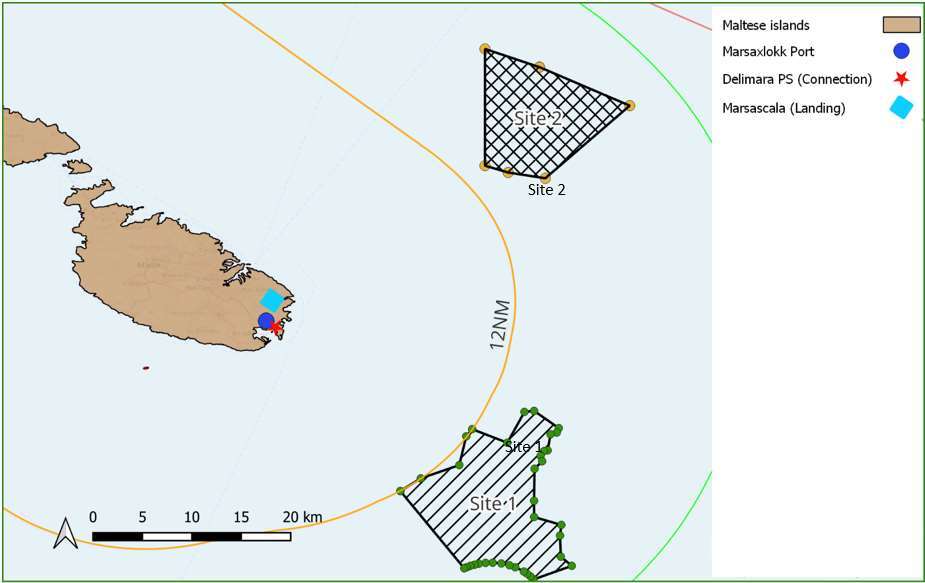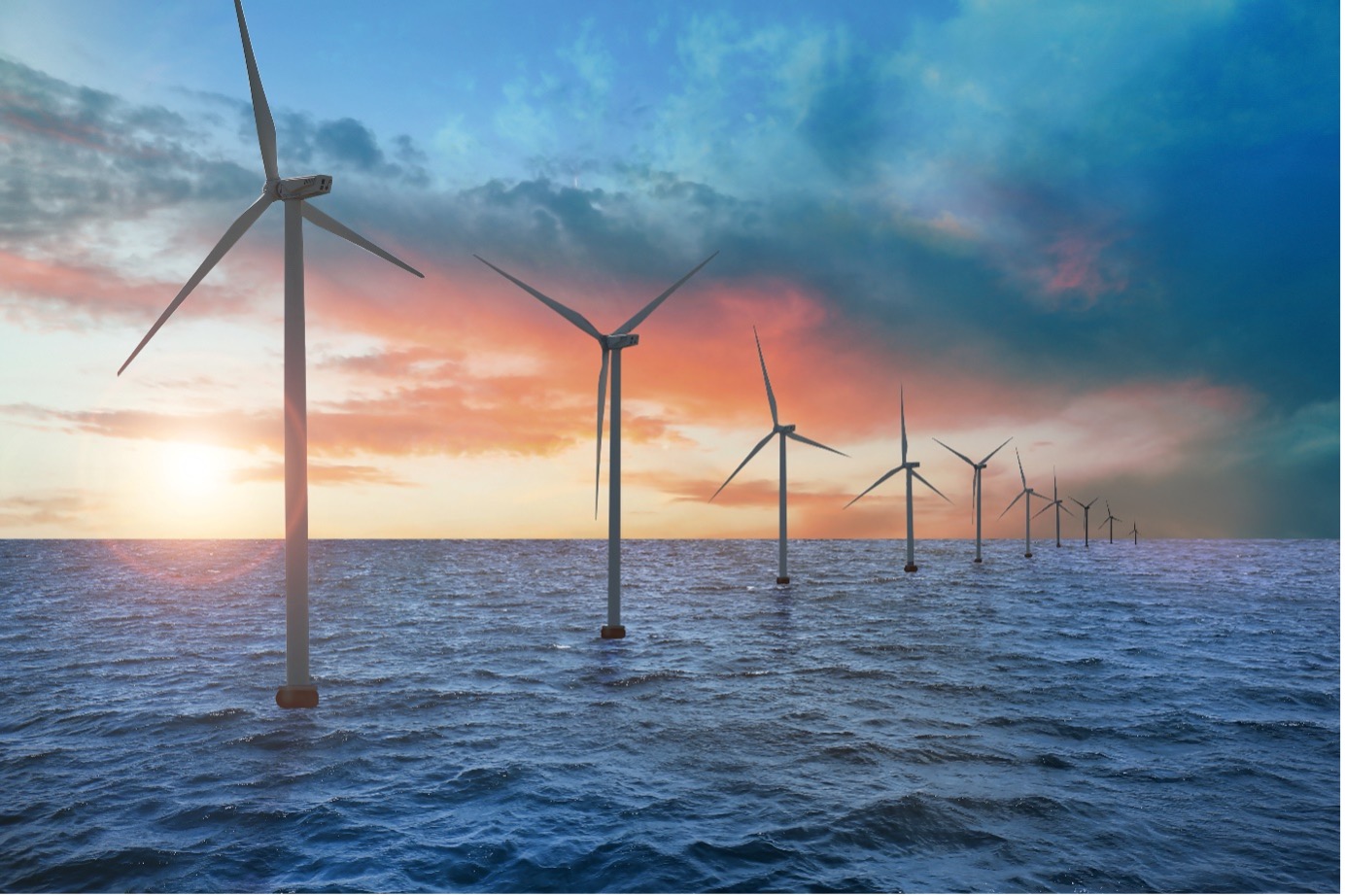The Project | Project Benefits | Malta’s Outlook | EU Strategy| ICM’s Role
Offshore Renewable Energy Project
The Project

The scope of the Project is to award contracts through a Competitive Dialogue Process whereby the Concessionaire shall be responsible for the design, construction, operation, maintenance, and decommissioning of an offshore Floating Wind Farm for renewable energy supply, in an area at sea which is beyond the territorial waters of Malta (i.e. 12 nautical miles) and which shall be within an area to be declared by Malta as its Exclusive Economic Zone (EEZ). The Concessionaire shall also be responsible for the operation and maintenance of an offshore substation and export cable system, which shall be owned by the Government of Malta. The installed capacity will be of around 300MW and this power shall be delivered to the local high voltage network at 132kV. This project will generate up to 0.8 TWh of clean, renewable energy annually.
To implement ambitious national and EU goals, the Government of Malta has taken steps aimed at signing a 35-year for a Offshore Floating Wind Farm Project, which includes state support for a 25-year operational period under a two-way Contract for Difference. Two sites will be made available to those participating in the competitive procedure, with one of these sites finally being developed though this concession. More details about the Project can be obtained from the Preliminary Qualification Questionnaire documentation which is available at this link.
The Government of Malta has already carried out a strategic Environmental Assessment as part of the development of a National Policy for the Deployment of Offshore Renewable Energy and continues to work closely with national entities to streamline the Project’s permitting process. The responsibility for obtaining final permits will rest with the selected developer, based on the specific details of the project and the chosen site.

Project Benefits
The floating offshore wind farm will play a key role in enhancing Malta’s renewable energy mix, complementing the island’s robust solar power infrastructure, while supporting the country’s commitment to the EU’s net zero carbon economy goal by 2050. Additionally, the project’s scale will create opportunities across Malta’s technical, financial, and educational sectors, fostering local expertise and driving economic growth.
EU Strategy on Offshore Renewable Deployment
To ensure that offshore renewable energy contribute towards the EU’s ambitious energy and climate targets for 2030 and 2050, the European Commission published a dedicated EU strategy on offshore renewable energy (COM(2020)741) in 2020 which proposes concrete ways forward to support the long-term sustainable development of this sector.
The Offshore Renewable Energy Strategy highlights the need to reach at least 300 GW of offshore wind and 40 GW of ocean energy by 2050 in the EU as a key means to reach climate neutrality, providing a major opportunity to ramp up renewables, develop a resilient industrial base in the whole EU and creating quality jobs, benefiting both coastal and landlocked Member States.
In 2023, the European Commission adopted the EU Wind Power Package. This includes a European Wind Power Action Plan (COM(2023)669) aimed at accelerating the deployment of wind projects and a Communication on achieving the EU’s offshore wind ambitions (COM(2023)668). The Communication builds on the 2020 Offshore Renewable Energy Strategy and proposes infrastructural, permitting, financing, innovation, skill, and supply chain measures with the aim of reaching the EU’s targets through 12 GW of offshore wind installations per year.

Malta’s Outlook
As part of Malta’s forward outlook and ambition in increasing the share of renewable energy, the Maltese Government is focusing on the development of its floating offshore renewable potential. This is being done with a view of establishing the necessary administrative and regulatory frameworks, which will enable the future deployment of larger-scale projects.
In parallel, pursuant to Article 14(1) of the TEN-E Regulation (EU) 2022/869, in December 2024, Malta has entered into a renewed non-binding agreement on goals for expanding offshore renewable generation in 2050. Through this agreement, Malta aims at deploying 350MW of offshore renewable capacity by 2050, with intermediate steps in 2040 and 2030 of 350MW and 50MW respectively.
Malta’s 2030 National Energy and Climate Plan, updated in 2024, reaffirms Malta’s commitment towards clean energy generation, highlighting offshore renewable energy as a key enabler of Malta’s decreased reliance on fossil fuels. The National Energy and Climate Plan identifies that the development of floating offshore renewables in Malta will contribute to the following Energy Union dimensions: greenhouse gas emission reductions, renewable energy penetration, energy security, research and innovation, and competitiveness.
Malta’s National Policy for the Deployment of Offshore Renewable Energy has been adopted in October 2024 and promotes the establishment of a sustainable offshore renewable industry in Malta. The policy also seeks to complement Malta’s regulation and implementation framework, supporting investors in materialising their offshore projects, reducing the time from concept to commissioning by assisting directly through effective governance and monitoring. The Policy identified six potential areas for the deployment of floating renewable energy. Following this, a strategic environmental assessment (SEA), these were narrowed to two areas which are most suitable for floating offshore renewable deployment.
Malta’s Low Carbon Development Strategy also highlights offshore renewable energy as one of the strategies to enable Malta to reach its environmental targets towards achieving carbon neutrality by 2050 and has since been studying offshore areas that can be dedicated to offshore renewables.
In May 2022, the Maltese Government issued a Preliminary Market Consultation (PMC) for The Proposal of Economic Activities within Malta’s Exclusive Economic Zone. The outcome of this consultation and the submission of interested economic operators is presently being assessed. The result of this exercise shall enable the Government to gauge the interest of potential investors to undertake activities and projects in the proposed exclusive economic zone area in line with the rights provided under the 1982 United Nations Convention on the Law of the Sea (UNCLOS) and the Malta EEZ Act.
ICM’S role
Further to Cabinet decision in January 2023, InterConnect Malta Ltd. (“ICM”) was assigned the role to act as a Project Implementor to plan, prepare, issue, recommend for award a concession for Offshore Renewables.